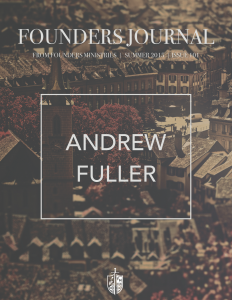The first text that I ever read by Andrew Fuller, in the mid-1980s, was his The Promise of the Spirit the Grand Encouragement in Promoting the Gospel (1810), a circular letter that he wrote for the Northamptonshire Baptist Association. Every year at its annual meeting the association, like other Baptist associations, would ask one of its pastors to pen a small tract that would then be printed and sent out to all of the church members in the association. This particular one is a fabulous little piece that introduces a number of themes dear to Fuller’s heart: the world-wide spread of the Gospel, the necessity of the empowerment of the Holy Spirit, and a concern on how to live with hope in the last days. It is one of a number of circular letters that Fuller wrote during his life for the association. They are an excellent introduction to Fuller’s writing and thought. Other circular letters that should be read include his Causes of Declension in Religion, and Means of Revival (1785)—a helpful overview of the subject of revival—and The Practical Uses of Christian Baptism (1802)—a superb treatment of the meaning of baptism.
Then, a must-read is Fuller’s Memoirs of the late Rev. Samuel Pearce (1800), where we see the heart of Fuller’s piety in what he admires most about his close friend Samuel Pearce—what Fuller calls Pearce’s “holy love” for God and humanity. What is critical about this work is that it delineates the spiritual ambience of Fuller and his circle of friends. Fuller’s The Gospel Worthy of All Acceptation (1785, 1801) is also a must read. This is Fuller’s superb demolition of hyper-Calvinism and his presentation of the biblical grounding for passionate preaching to the lost. It is essential reading as it lies at the foundation of the modern missionary movement. William Carey’s iconic mission to India has for its theological rationale this work by Fuller.
A second key work of apologetics is Fuller’s Strictures on Sandemanianism (1810), in which Fuller responds to an intellectualist view of faith that had particularly harmful spiritual effects. There were a number of major theological responses to the errors of Sandemanianism, but Martyn Lloyd-Jones believed that this work of Fuller was the key rebuttal of this system. Fuller’s dependence on his mentor Jonathan Edwards is very evident in this work. Although Fuller became renowned in his day for his apologetics, he never lost his pastoral focus. This focus is clearly seen in his sermons—see especially his The Nature and Importance of Walking by Faith (1784), The Qualifications and Encouragement of a Faithful Minister Illustrated (1787), and The Nature and Importance of an Intimate Knowledge of Divine Truth (1796). His dozen or more ordination sermons are also a superb delineation of how an eighteenth-century Calvinistic Baptist viewed the ministry.
All of these texts can be conveniently found in either a three-volume edition of his works—The Complete Works of the Rev. Andrew Fuller, ed. Joseph Belcher (1845 ed.; repr. Harrisonburg, VA: Spinkle Publications, 1988)—or the one-volume The Works of Andrew Fuller (1841 ed.; repr. Edinburgh/Carlisle, PA: The Banner of Truth Trust, 2007). The author’s The Armies of the Lamb: The Spirituality of Andrew Fuller (Dundas, ON: Joshua Press, Inc., 2001) introduces Fuller’s piety through a series of edited texts from his writings and letters.
With regard to secondary sources, the best of recent Fuller biographies are those of Peter J. Morden, Offering Christ to the World: Andrew Fuller (1754–1815) and the Revival of Eighteenth Century Particular Baptist Life (Carlisle, Cumbria: Paternoster Press, 2003) and Paul Brewster, Andrew Fuller: Model Pastor-Theologian (Nashville, TN: B&H Academic, 2010). Finally, John Piper has an excellent lecture on Fuller at the Desiring God website: “Holy Faith, Worthy Gospel, World Vision: Andrew Fuller’s Broadsides Against Sandemanianism, Hyper-Calvinism, and Global Unbelief” (2007).






















